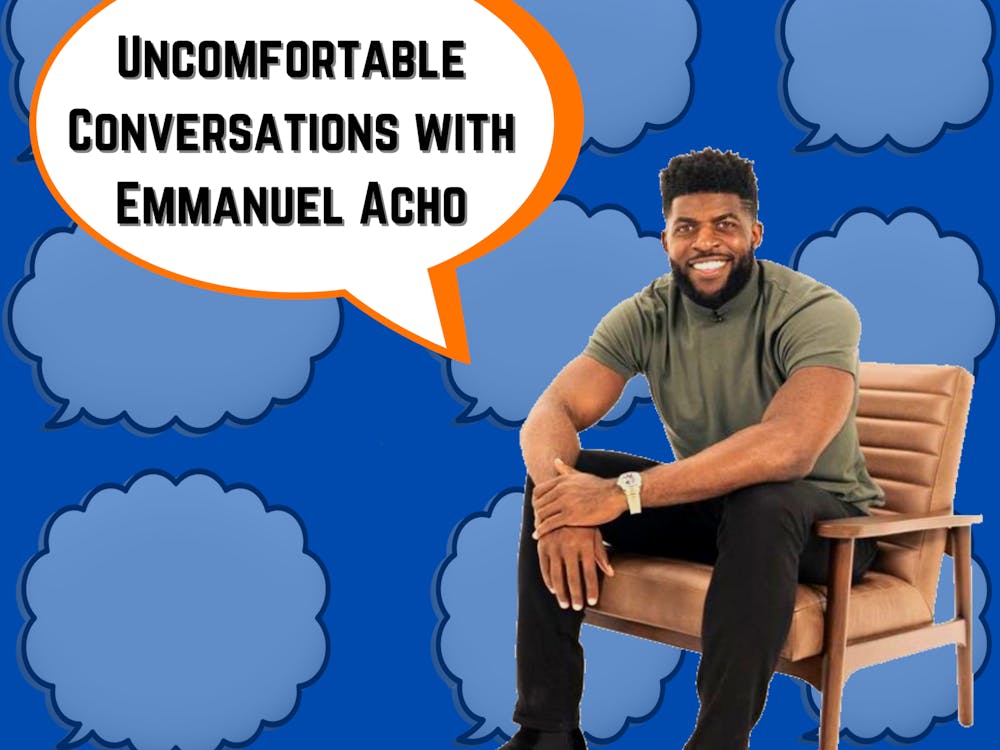Former NFL linebacker, activist and co-host of FS1’s “Speak for Yourself” Emmanuel Acho spoke live to UF students in a free event at the Curtis M. Phillips Center for the Performing Arts Monday.
The conversation involved topics such as racism and cultural appropriation. Acho shared insight on his upbringing as a Nigerian-American, his NFL career and his popular video series “Uncomfortable Conversations with a Black Man,” which had garnered more than 15 million views on YouTube.
The event was organized by the Accent Speakers Bureau, a Student Government agency focused on bringing speakers to entertain and educate UF students, which paid Acho $110,000 for a 45-minute conversation moderated by UF journalism professor Herbert Lowe and followed by a 15-minute Q&A session.
As the first Accent event of the semester, the event is a reflection of a $250,000 reserve funds transfer made in addition to the agency’s yearly budget of about $500,000.
Acho spent the first couple minutes of the event touching upon his childhood as a first-generation Nigerian-American. He talked about the many different cultural influences that played a role in who he was today.
“It was different man. Because I grew up obviously Black by skin color, but was cultured very differently,” he said. “It was a very different upbringing but it allowed me to be immersed in so many different cultures.”
Acho said he grew up in a Nigerian household, eating rice and stew for dinner, but was cultured white through a private school called St. Mark’s School of Texas.
The discussion then turned towards the creation of Acho’s YouTube series during the start of the Black Lives Matter movement, “Uncomfortable Conversations with a Black Man,” which Acho said started when he recognized the disconnects that society has on certain issues and the murder of George Floyd.
“So, what we all realize in 2020 and 2021 is that there’s disconnects in society,” Acho said. “We don’t all look at things the exact same way.”
Seeing the different perspectives of polarized topics at the verge of the COVID-19 pandemic, Acho was drawn to take action.
“After the murder of George Floyd, I realized that something has to be done,” he said. “I realized that I had to be the person to speak.”
The original idea for the first episode of the series was that Acho would be speaking with a close, white friend of his. However, the day of filming, the friend backed out.
“We rehearsed the night before and went over everything,” he said. “She was going to ask the questions. But the morning of, she’s crying… She’s freaking out, so I end up doing it by myself.”
Instead of having someone ask him the questions, Acho sat by himself in front of the camera and answered each question.
“I’m sitting in an all-white room by myself and I answered four questions: Why are Black people rioting? Why can Black people say the n-word and white people can’t? What about white privilege? What about Black-on-Black violence in places like Chicago?”
Acho then commented on why he believes most people fail to talk about these sensitive issues in a way that’s constructive.
“The reason I think that a lot of people don’t cut through is that they only use truth. You have to use truth, grace and love. Because if you only use truth, it’s too harsh. If you only use grace, it’s too superfluous. It’s nice, but it’s meaningless. You have to do a balancing act of both.”
Although Acho aims to educate and inform with his videos, he said he’s aware that it will take more than just books and videos to solve racism.
“You can’t fix a problem you don’t know exists,” he said. “It will take far more than some videos and far more than a book to solve racism.”
Acho spent a large part of the night on the subject of racism. He talked about how fear from white people asking the wrong questions combined with Black people being on edge has made it difficult to tear down barriers and have conversations.
“I think the biggest mistake America ever made was outlawing segregation,” said Acho. “I say they should’ve mandated integration. There’s a huge difference. Because when you outlaw segregation, all you do is take a word and put it in parentheses. All you do is take down the ‘Whites Only’ sign and you still read it in your head and in your heart, but you don’t say it out loud… the issue in our society is that there isn’t enough integration.”
Acho peppered in his points through personal anecdotes, adding moments of humor throughout the night. He retold the story of how actor and fellow Texas alumnus Matthew McConaughey reached out to him just a few days after he published his first YouTube video.
“After the first episode, four days go by … my phone rings,” Acho said. “No Caller-ID. I picked it up. ‘Acho. It’s McConaughey. I want to have a conversation.’ McConaughey? Like Matthew?”
Acho also recounts the time he appeared on Oprah Winfrey’s Apple TV show, “The Oprah Conversation,” where he answered questions regarding racism from white and latinx viewers.
“So Oprah is on-screen, and there are like iPads with ten different faces of different people across the country,” Acho said. “Somebody would ask me a question like ‘Emmanuel, can you define white privilege?’ I would answer. ‘Emmanuel, what’s reverse racism?’ I would answer.”
Joe Muldoon, a 20-year old UF music Junior, came to the event with a friend. Muldoon didn’t know who Acho was, but he was pleasantly surprised by the event.
“I’d say based on what he said, I’m gonna go and watch his videos more. He was a really intelligent and eloquent person,” Muldoon said.
Contact Brian Olmo at bolmo@alligator.org. Follow him on Twitter at @BrianOlmo0211.






